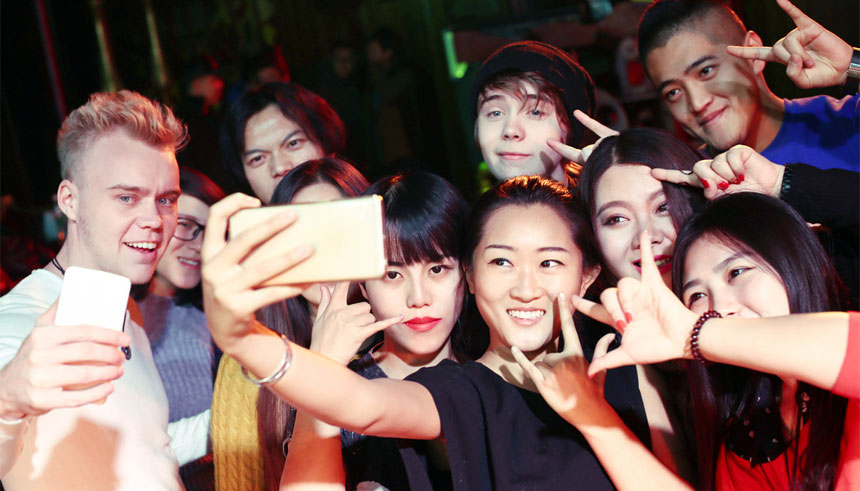U.S.-Asia Business
China's Millennial Consumers: a Generational Leap
By Daniel Allen

Complex and connected, China’s millennial super consumers are a growing force.
China's millennial generation is exercising a growing influence on the Chinese and international marketplaces, disrupting economic models and driving innovation. As they embrace everything from mobile e-commerce and the sharing economy to international travel and stay-at-home culture, they are forcing a growing range of companies - both Chinese and Western - to re-examine how they do business.
Born in the 1980s and ’90s, China's millennials represent a vast army of educated, independent, tech-savvy consumers. According to a recent report by Goldman Sachs, they now number around 415 million, or 31 percent of the total Chinese population. This key demographic is also increasingly wealthy; according to the same report, aggregate millennial income is set to grow by US$3 trillion during the next decade, with average annual incomes rising from US$5,900 to US$13,000.
Yet despite this growing prosperity, the majority of Chinese millennials now live in a highly pressurized world. From soaring real estate prices and an increasingly competitive domestic labour market to concerns over health, the environment and China's general economic slowdown, they face challenging issues and insecurity on a daily basis.
As they market their goods and services to Chinese millennials, Western companies frequently view things from an outdated, outside perspective. They overlook the complex issues and cultural nuances that could help their brands succeed. Yet those with real intelligence and insight may be rewarded. Chinese millennials may be the wave of the future. What they demand now, consumers all over the world may demand tomorrow.
Digital drivers
It is the jiulinghou, or "Post-’90s" millennial subset, that is now driving the most change in China. Thanks to Beijing's one-child policy, which lasted from 1980 until 2015, few in this demographic have any siblings. Born during the Chinese economic boom years, they have typically enjoyed a far higher standard of living than their parents. They have grown up with widespread internet access, and many have studied and travelled abroad.
"This is a generation whose formative years have seen a profound shift toward capitalism and economic growth," says Merlin Linehan, a former financial analyst who consults on trade, investment and economics in China and provides analysis on global macro economics for Wikistat. "They are well educated and have a radically different outlook compared to anyone else in the country."
"They are more worldly, entrepreneurial, individualistic, open-minded and willing to spend," says David Lung, a managing partner with Deloitte China. "Already important consumers, they have the potential to become even more influential through career advancement and wealth accumulation."

"They are more worldly, entrepreneurial, individualistic, open-minded and willing to spend."
Like their demographic counterparts in the West, Chinese millennials spend much of their lives online. What differentiates them is their mobility. According to research by Deloitte, around 97 percent of Chinese people between the ages of 14 and 47 now own smartphones. Deloitte's figures show that more than half of this generation access the internet through their smartphone more than 26 times a day, and 10 percent more than 100 times a day.
Demonstrating a willingness to adopt new mobile apps and websites, millennials have underpinned China's e-commerce boom, embracing new lifestyles that have revolutionized the way they consume content, communicate, shop and eat. As they drive O2O (online-to-offline) commerce, business transactions that once would have been initiated in person are increasingly being sourced online.
"Through their usage of online and mobile platforms, as well as their increasing spend on health, technology, travelling, service, education and luxury products, Chinese millennials are changing the very nature of retail in China," says Zennon Kapron, founder of financial research firm Kapronasia, which has offices in Shanghai, Hong Kong, Singapore and New Delhi.
Home and away
China's millennials display some unique behavioral trends, not the least of which is the rise of zhai or "homebody" culture. The ubiquity of high-speed internet in urban areas, coupled with frequent overcrowding and limited offline entertainment options, has meant a growing number now spend most of their leisure time at home. Inhabiting an online world, they play, socialize and purchase everything from pizza to perfume through digital channels.
"With more urban Chinese millenials becoming ‘zhai,’ consumption that once took place outside is increasingly moving inside the home," says Federico Sferrazza, a consultant with Daxue Consulting, which conducts market research and management consulting focused on the Chinese market for more than 100 clients from their offices in Beijing, Shanghai and Hong Kong.
The fact that more and more millennials are now staying at home means that a whole industry has developed to deliver meals, groceries and other products to them. According to Chinese market research company Analysys International, China's online takeout market was worth RMB45.78 billion (US$7 billion) last year, and is set to reach RMB245.5 billion (US$37.5 billion) by 2018.
Partly because they spend so much time surfing the net, China's millennials also have a far more international outlook. As a result, many have a serious case of wanderlust. A report from German market rearch company GfK shows that of China's 109 million outbound travelers in 2015, who together boasted a retail spend of US$229 billion, half fell in the 15-29 age bracket.
"Compared to the older generations, younger Chinese prefer more flexibility," says Deloitte China's Lung. "This is why independent travelling is becoming increasingly popular. Millennial travellers are also willing to spend more and are less sensitive to budget."
Chinese millennials are also buying into the "sharing economy," which was already worth nearly US$300 billion in China in 2015, according to the country's National Information Center. As they travel overseas, they are using services like Airbnb and Uber, as well as their Chinese equivalents, Tujia.com and Didi Chuxing (formerly Didi Kuaidi).
Challenges and opportunities
As their spending power increases and behavioral trends evolve, Chinese millennials will continue to create new market opportunities for both domestic and Western companies. But as China's most influential demographic trades up and becomes ever more discerning in its preferences, business strategies will have to be adjusted.
"Chinese millennials are a complex group," says Deloitte China's Lung. "Understanding their preferences, habits and values takes time. Advertising, product design and experience enhancement should all be based on solid research."
Chinese millennials tend to be very brand-aware, typically associating foreign goods with superior quality. Yet as the standard and sophistication of domestically produced goods steadily rises, their focus on foreign products is becoming less exclusive. They may not be particularly price sensitive for some goods and services, but frequently compare prices across multiple e-commerce platforms.
With their better employment and lifestyle opportunities, most Chinese millennials have, to date, preferred to stay in China's first-tier cities. But rising living costs mean that many are now struggling to survive in places such as Shanghai and Shenzhen, where soaring home prices are currently outstripping salary growth.
"Extremely high living cost in cities like Shanghai may become a factor that increasingly influences decisions," says Deloitte China's Lung. "Some second-tier cities, such as Chengdu and Wuhan, are enjoying rapid economic growth and relatively stable living costs. These cities may attract more millennials in the future."
"Some second-tier cities, such as Chengdu and Wuhan, are enjoying rapid economic growth and relatively stable living costs. These cities may attract more millennials in the future."

Many Chinese brands prefer to build market share by migrating from smaller cities upward. As China's second-, third- and even fourth-tier cities continue their whirlwind development, Western companies may prefer to look beyond the saturated consumer markets of Shanghai and Beijing as they target millennials.
Future focus
Despite China's ongoing economic transition away from low-value manufacturing, growth in Chinese consumption is likely to remain buoyant for the foreseeable future. A joint study by The Boston Consulting Group and AliResearch, the research arm of Alibaba Group Holding Ltd., predicts that even if Chinese annual GDP growth falls to 5.5 percent (well below government claims of nearly 7 percent a year now), China's consumer economy will expand by a staggering US$2.3 trillion during the next five years.
With economic data showing that investment-led development is becoming less effective in China, Beijing has a vested interest in boosting domestic consumption, both in urban centers and in less-developed rural regions. China's new youth are set to play a crucial role. Companies who want to ride the Chinese millennial bandwagon will have to work hard to stay on board.

